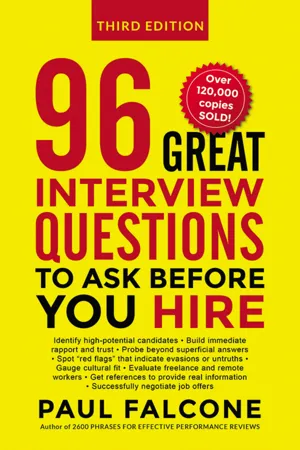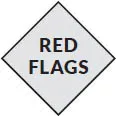![]()
PART 1
INTERVIEW QUESTIONS TO IDENTIFY HIGH-PERFORMANCE CANDIDATES
![]()
1.
Five Traditional Interview Questions and Their Interpretations
Let’s begin by examining the most often used interview questions and putting a new spin on their interpretations. These questions have stood the test of time, and we should consequently recognize their value in the candidate-assessment process. Their inherent weakness, of course, lies in their overuse. Most of us can remember being asked these questions during our own interviews. And job-finding books and career magazines abound with suggested responses to help candidates steer clear of the interview-questioning snare vis-à-vis these popular queries waiting to trip them up.
Our exercise in this first topic, however, isn’t to employ questions just because they’ve been around for a long time. And it’s certainly not to offer candidates an opportunity to practice their well-rehearsed lines. We will, instead, offer new interpretations in reading candidate responses.
1
Tell me about your greatest strength. What’s the greatest asset you’ll bring to our company?
Why Ask This Question?
The “greatest strength” question works well as an icebreaker because most people are fairly comfortable talking about what makes them special and what they like. Every job candidate is ready for this one because it gets so much attention in the career press. Job candidates are also aware that this query is used as a lead-in to a natural follow-up question (which is much tougher to answer): “What’s your greatest weakness?” Still, the greatest-strength question isn’t a throwaway, because it can reveal a lot about an individual’s self-perception. So let’s open it up for a moment.
Analyzing the Response
There are two issues to watch out for in measuring a candidate’s responses. First, candidates often give lofty answers with lists of adjectives that they think you want to hear and that actually add little value to your meeting. Second, a candidate’s strengths may fail to match your unit’s needs and thus could weigh as a negative swing factor in the selection process.
Watch out for people who give long inventories of fluff adjectives regarding their nobler traits, such as hardworking, intelligent, loyal, and committed. Adjectives are nothing but unproven claims. They waste time and delay getting to what you really want to get out of this meeting, which is concrete proof of how the individual will fit in and contribute to the team. Consequently, you’ll have to keep the candidate on track by following up on these adjective lists with requests for practical applications. For example, when a candidate says she’s proudest of the fact that she’s a hard worker, you might respond:
“Hard workers are always good to find. Give me an example of how hard you work relative to your peers.”
“Hard work usually results in above-average results. How has your hard work paid off in terms of the quantity of your output or the quality of your work product?”
“Hard work in our company boils down to working late hours fairly often and occasionally coming in on Saturdays. How does your present company define hard work?”
“How has your boss recognized your hard work? How would she say that you could have worked smarter, not harder?”
The idea here is to qualify this person’s generic response. The second red flag issue occurs when a candidate’s strengths fail to match your organizational needs. For example, a candidate may respond, “I guess I would say that I’m proudest of my progression through the ranks with my last company. I was promoted four times in as many years, and I feel that a company’s ultimate reward to its people can be found in the recognition it gives via promotions and ongoing training.” That’s an excellent response. The position you’re filling, however, may offer few vertical growth opportunities because you need someone who would be satisfied with repetitive work. This is a classic case of right person—wrong opportunity, and the greatest-strength query will have done its job of identifying a candidate’s motives and expectations. Consequently, you might opt to disqualify the candidate for this particular position.
2
What’s your greatest weakness?
Why Ask This Question?
Other variations on this theme include:
“What would you consider to be your occasional fault or over-strength?”
“Of your past supervisors, who would give you the weakest reference and why?”
“What one area do you really need to work on in your career to become more effective on a day-to-day basis?”
You would think that most job candidates have planned responses to these often-asked queries. That’s not always the case, however. A surprising number of people out there still give little advance thought to this common self-evaluation query. You could use that element of surprise to your advantage.
Analyzing the Response
The greatest-weakness question is somewhat unnerving because it causes discomfort. After all, no one wants to discuss shortcomings. Although the purpose of the question is certainly not to make anyone uncomfortable, many unsuspecting individuals will use this entree as an invitation to come clean and bare their souls to you. That’s when you’ll learn that they sometimes run late getting to work, feel intimidated in any kind of public-speaking forum, or tend to be overbearing with coworkers.
Note as well that it’s a poor answer for candidates to respond that they have no weaknesses. After all, interviewing, to a large extent, is a game to see how deftly a person lands on her feet. By admitting no weaknesses, the person refuses to play the game. In that case, you’ll need to provide a gentle nudge along the lines of, “Oh, Janet, everyone has some kind of weakness. What should I expect to be your shortcomings if we work together on a day-to-day basis?” If that coaxing fails to produce a response, beware the precedent that is being set toward poor communications and a lack of openness.
Good Answers. In contrast, what are acceptable responses that place a candidate in a favorable light? Look for replies that center on the person’s impatience with her own performance, inclination toward being a perfectionist (which could slow the individual down but guarantees quality results), or tendency to avoid delegating work to others for fear that it won’t get done to the candidate’s high expectations. In short, the wisest “weaknesses” are strengths taken to a fault. After all, people who are impatient with their own performance typically have high expectations of themselves. Neatniks can’t bear the possibility of sending out letters that contain errors. And those who have difficulty delegating are results-oriented, focused individuals who generally don’t watch the clock.
How to Get More Mileage out of the Question. Once again, the key to adding a broader dimension to the candidate’s response lies in employing a behavioral interviewing format. Try looking for contrary evidence that focuses on the negative impact of the person’s actions. For example, typical comebacks you could use to the reply “I have problems delegating work to other people because I find that the end result doesn’t meet my expectations” might include:
“Tell me about the last time you didn’t delegate work to a subordinate and you were left handling a disproportionate amount of the workload. How did you feel about that? How did you handle that situation differently the next time?”
“Give me an example of a time when your not having delegated work to a direct report left that person feeling that his career-development needs weren’t being met.”
“Share with me a circumstance in which you were frustrated by your boss’s inability to delegate work to you. How did you eventually gain that person’s trust?”
The variations are limitless. Candidates have no way of preparing canned responses to behavioral interview questions, and therein lies the true beauty of the behavioral query.
3
What was your favorite position, and what role did your boss play in making it so unique?
Why Ask This Question?
Much like the greatest-strength question, this query invites the interviewee to reflect on positive and comfortable emotions. It also prepares the stage for the related question to follow (which is much harder to address), “What was your least favorite position or company?” Still, there are telling clues in the individual’s response, so let’s look for the salient issues.
Analyzing the Response
Human-resources professionals and executive recruiters will attest to how warm and cozy this query generally makes candidates feel. Their shoulders will often totally relax, and a warm smile will appear. Their responses, however, could indeed knock them out of consideration for a job when they sell a love for a particular aspect of a past position that you are not offering.
Take the case of a marketing representative named Joan. When the question about favorite jobs came her way, she mistakenly mentioned one that was extremely creative and got her out of the office a few hours a week. She had worked for an international firm that offered the opportunity to entertain foreign dignitaries, and she had been responsible for giving tours of the company’s solar energy plant.
Granted, that may be why that particular job stood out in Joan’s memory. However, because the job she was applying for didn’t offer those nontraditional perks, she ended up selling her love of tasks that she wouldn’t be handling on the new job. She consequently weakened her case because the company felt that she was overqualified—in other words, the organization couldn’t offer her the glamour and variety she was accustomed to and felt she wouldn’t be stimulated in its nine-to-five environment.
Note as well that statistically, a majority of people leave their jobs because of personality conflicts with their boss. No matter how well the company fares, once that key interpersonal relationship sours, there’s little opportunity left for a subordinate to assume greater responsibilities, earn significantly more money, or remain part of the unit’s succession plan. Therefore, you want to connect what role a boss played in making a job a favorite position, just as you want to tie in the supervisor’s role in making a job a least-favorite position.
4
What was your least-favorite position or company? What role did your boss play in your career at that point?
Why Ask This Question?
Body language changes quickly when candidates are presented with an invitation to criticize or censure a former boss or company. After all, this query baits individuals to complain about the people to whom they should be most loyal. The ideal candidate response avoids subjective, personal interpretations that force respondents to defend their past actions. Instead, a solid response will address objective issues that place an impersonal distance between the candidates and the external factors that interfered with their ability to reach their personal best. In short, look for job candidates’ abilities to objectively evaluate a situation rather than irrationally react...













